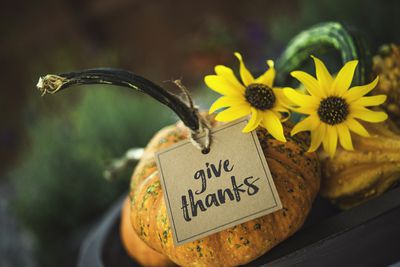 We have heard it time and again – that being thankful makes us feel better. When we count our blessings, we acknowledge what we do have as opposed to what we don’t have.
We have heard it time and again – that being thankful makes us feel better. When we count our blessings, we acknowledge what we do have as opposed to what we don’t have.
In spirit of the Thanksgiving holiday, I wanted to take this topic of thankfulness to a deeper level – from both a psychological and scientific standpoint – in order to showcase the powerful impact it has on our lives.
Before we get into that – let’s briefly talk about what happens when we are the opposite – when we are ungrateful.
Ask yourself, “What am I most ungrateful for?” I participated in this exercise the other day in a room full of people. The responses were not surprising. Some people were ungrateful for all the email they receive, while others were ungrateful for certain relationships. Some were least grateful for the responsibilities they had at work and at home.
What happens when we see these aspects in our lives as “negative”, is that we wind up going down a path of cynical feelings that can lead to “drama” and gloom. Do you feel stressed? Do you feel negative? Do you have drama in your life?
When we are frustrated, angry, jealous, or sad – we go down the dramatic and negative path of what is wrong in our lives. What we don’t have. What we should have done or what we do have that drives us nuts.
We focus on the negative aspects of living that often results in us feeling bad, stressed, anxious, and burned out.
These feelings can then lead to sleeping problems, overeating, drinking too much alcohol, craving sweets – all of the things that can lead to health problems.
When health problems settle in – from the negativity and stress in our lives – we create a cycle of issues because with poor health often comes more stress – and more frustration. It is a downward spiral.
Yet – just by changing the ungrateful thoughts to grateful ones – we have the power to turn our lives around starting at the biological level. Taking antidepressants can increase our levels of dopamine and serotonin in the brain to make us feel better. Feeling grateful does the very same thing – it activates the same areas of the brain that produce these neurotransmitters.
More powerful than this – is research that shows the actual searching of something to feel grateful for affects neuron density in certain parts of our brain – making our brains more efficient to the process of feeling grateful. In other words, the more you make gratitude a habit, the easier it is for it to become an automatic response to daily events.
Here are two exercises that can help put you on the path to feeling good:
- Make a list of 5 things you are grateful for each day to begin developing this positive habit. The more specific you are, the better. IE: “I am thankful for my son.” versus “I am thankful for how thoughtful my son is in making me coffee each morning.” When you attach more meaning to your gratitude by being specific, you make a more powerful feeling and statement of thankfulness.
- Another way to increase your gratitude is to list out all the challenging times of your life. All of the pain points you have experienced starting with your earliest memory. This could be something as trivial as having your toy stolen – to something as heart wrenching as losing a loved one. Going back and pinpointing 2-3 positive aspects of those times creates a powerful shift in your perception because it takes you out of the negative and dramatic side to a grateful, purposeful and appreciative side – an enlightened place that can bring you to a place of strength and wisdom and peace.
Many people find it difficult to do this particular exercise, especially if it is something that occurred in the recent past. Yet, there is always something to glean from these situations – it may take you a few years to get to that place to find it – but it is there.
For example, when someone we love passes on, what can we see that is positive? It may be the wonderful memories you share, or the legacy s/he leaves with you. Perhaps you were taught something from your experience with this person. Moreover, it can help you appreciate life and living it to its fullest because it is a reminder that everything is temporary – and everything here is to be appreciated.
Even the horrible times of our lives, it could be an illness or disease, or it could be a family conflict or even an accident. These experiences are filled with emotions. These feelings can direct us to a feeling of gratefulness for what we gained from the experience, or a feeling of ungratefulness when we focus on what we lost.
I’m not saying you shouldn’t feel sad or hurt about them – but I am suggesting once you go through the painful feelings – to reach for the higher perspective – which is within gratitude and appreciation. There is always something to learn, to grow, to evolve from these experiences.
It really is in how you perceive something that will break you or take you to a higher level of existing.
Take a look at how you perceive your everyday life: When we come from the standpoint of “I have to go to work” or “I have to go pick up the kids.” – we are coming from a negative side – an ungrateful side.
Feeling this ungratefulness can lead to frustration, stress, and spiral downward into more serious consequences.
The simple switch of the perception channel from an “I have to” standpoint to an “I want to” or “I get to” standpoint makes all the difference in directing you towards feeling appreciate and grateful.
Think about it. Saying, “I get to go exercise” or “I get to take a walk” versus “I have to go exercise” – reminds us of the gifts we have of walking and moving our bodies – and how fortunate we are to have these gifts, as some people may not.
“I get to go to work,” or “I want to clean my house” moves us to a higher perspective of gratefulness and appreciation. Approaching it this way, we remind ourselves how good it feels for the end result. We focus on the positive outcome in how great we feel when the house is clean or when we get our paycheck and make a difference when we work.
So, when we are sitting around the Thanksgiving table this week – when your family members are driving you nuts, the food is burnt, and the house is a mess – remember what its all about.
Its about appreciating the goodness in each of us – and being grateful for all of life’s experiences.
Happy Thanksgiving everyone!
Dr. Renée
Renée Kennedy-Edwards, PhD

